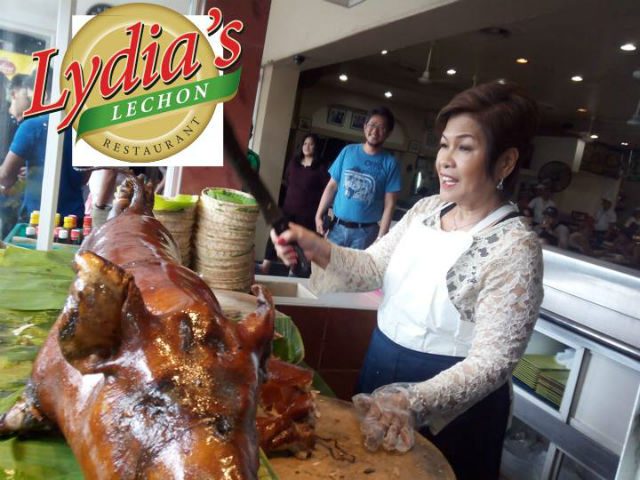SUMMARY
This is AI generated summarization, which may have errors. For context, always refer to the full article.

As the International Women’s Month comes to a close, it’s a good time to share the story of a self-made entrepreneur and her advice to families of overseas Filipino workers.
If there is one name synonymous with the lechon business, it’s Lydia’s. But very few people know that Lydia’s Lechon was built from scratch by a former domestic worker and sidewalk vendor.
The feisty Lydia Pasion de Roca, now in her 60s, started as a sidewalk vendor in Baclaran at 12 years old.
Born to poor parents, Lydia learned the lechon business from her father who sold pork and other meats for a living.
A product of a broken home, she grew up trying to figure things out by herself, from business to the more personal aspects of her life. There was a time when Lydia found herself running away from home and ending up working as a domestic worker in Baguio City. Soon enough, she learned to make peace with her parents accepting their separation at a tender age.
“Even when I was young, I already knew the value of money. My father paid me a daily wage of 20 centavos to sell lechon in Baclaran. When I turned 12 years old, I told my father to let me buy and sell lechon instead of relying on my salary.”

In 1965, a whole roasted pig cost only P80. Initally, Lydia bought 5 kilos of lechon from her father to sell on the sidewalk of Baclaran.
From childhood to motherhood, Lydia learned all the ropes of the lechon business, and continues to chop lechon in her Baclaran restaurant till today.
In business, being the first to say yes had always been Lydia’s style. “I have guts. Even amid financial and personal struggles, I was not one to give up. I am in charge of my own life,” the businesswoman said.
She recalls that day many years ago when a purchaser from a five-star hotel in Quezon City passed by her Baclaran stall to order 5 roasted pigs per week. The purchaser asked the young entrepreneur: “Can you handle this weekly order?”
Lydia immediately said yes! Once she got the order, she figured out how to rent a vehicle, hire extra pair of hands, and purchased more pigs to roast on her own. She met the deadline, and the expectations of the purchaser. One hotel led to another, and soon, her stall received more orders for lechons from various five-star hotels.
Henry Sy’s offer
The feisty “chop-chop” lady owes a debt of gratitude to Henry Sy, the mall mogul, for giving her a lucky break in 1989.
Like clockwork, Sy dropped by her restaurant in Baclaran every Sunday at lunchtime to buy ¼ kilo of lechon. One day, the simple yet wealthy businessman asked Lydia,”Would you like to put up an outlet in our mall?” Once again, she said, “Yes!” This led to the expansion of Lydia’s Lechon into a fastfood and restaurant chain offering various dishes.
Lydia reserves a special place in her heart for families of overseas Filipino workers who spend family reunions at her restaurants. While growing up, she had her own share of sacrifices including not being able to set foot in college because of extreme poverty. She sympathizes with OFWs who have to leave the country in order to finance the education of their children.
“My advice to OFW families is to use the remittances sent by their loved ones wisely. Consider these as blessings that should be saved and invested well. There is really no substitute for hard work because you can’t be an overnight millionaire. Wealth is built gradually through savings, investments and lots of hard work,” Lydia said.
The lady entrepreneur admits to being touched by stories of OFWs using online sites to order lechon from her outlets and having it delivered in time for the family’s special occasions.
She also notes how OFWs and their families would celebrate family reunions at her restaurants. “Kakaiba ang saya nila. Nakaka-touch tuwing makikita ko na nagkakasama-sama sila.” (They exude a different kind of joy. I am moved whenever I see OFW families reunited.)
Today, Lydia can still be found behind the counter of her Baclaran outlet. She makes sure that every order is proportioned right, and every customer is attended to right away.
She is particularly proud of her 3 children who now help her run the family business. “I am proud that they are now able to run their own outlets,” she said.
With several Lydia’s Lechon outlets and 3 franchisees, the owner of Lydia’s Lechon remains a devotee of Our Mother of Perpetual Help and the Black Nazarene. The former sidewalk vendor now has 500 employees.
“To all the women out there, my advice is to use your head and not just rely on pure emotions. Whenever you are presented with a good business opportunity, just say yes then figure out how to deliver on your promise. “
She observed that women are made of stronger stuff, and once they gain the confidence and experience needed to run a business, they inevitably shine and become successful. “Matibay ang mga babae. Kailangan lang ine-enjoy at mahal nila ang kanilang negosyo.” (Women are resilient. They just need to enjoy and love their business.) – Rappler.com
Writer and OFW advocate, Susan Ople was a recipient of the Trafficking in Persons Hero Award from the US State Department in 2014. She has a weekly column in Panorama Magazine, Tempo, and Arab News. Her non-profit organization, the Blas F. Ople Policy Center, assists distressed OFWs all over the world.
Add a comment
How does this make you feel?
There are no comments yet. Add your comment to start the conversation.